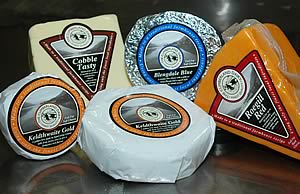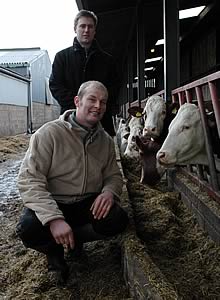 |
|||||||||
|
||||||||||||||||||||
|
|
Cumberland
Dairy Quest for Added Value 05/09/06 Three Cumbrian dairy farmers have formed their own processing company to add value to milk produced in the county.
Their quest was to achieve better milk prices by adding value and the four different types of quality cheese they are already marketing are adding between 75p and £1.20p per litre over the cost of production. Chris Johnston, of Abbey Farm, Skirwith, Penrith, Gary Simpson, of Knock Cross Farm, Long Marton, Appleby and Kevin Beaty, of Hilltop Farm, Ivegill, Carlisle, are as diverse a group of Cumbrian dairy farmers as could be found. They formed The Cumberland Dairy in 2004 after a series of catalyst meetings in the county organised under the umbrella of the Rural Futures project whose aims are to assist the farming community in Cumbria to respond to the need for change, support farmers to help them change and to foster increased collaboration amongst farmers. Backed by £50,000 of research and development by Distinctly Cumbria and Leader+ with private contributions of £4,000 each from the members themselves, four different types of cheeses have been developed through Coleg Menai's Llangefni food technology centre. Production began last July and currently The Cumberland Dairy is processing 7,500 litres a month producing 750kg of cheese with the immediate goal being set at a tonne a month. Sales are already through a number of retail outlets across Cumbria as well as through hotels and restaurants which are presently accounting for 85 per cent of sales. The majority of the sales are wholesale and internet sales may be a future consideration. “The initial meetings came about during the process of recovery from foot and mouth and the fact that Cumbria along with Devon is the largest milk producing county in the UK yet all its milk is transported out of the county to add value to it,” said Chris Johnston, who acts as the business’s production manager. “The bottom line was to find a better milk price by going down the added value route. After the initial meetings only four of us remained committed but this gave us a better ability to make decisions on how we were to progress. “We decided to go initially into cheese production because it uses a lot of milk – 10,000 litres are required to produce a tonne of cheese.” While the success of the business is such that it is on target to break even during the first year, despite budgeting for a loss, the amount of milk processed is too small to allow the four producers to supply their own milk as contracts with dairy companies will not allow a proportion of a herd’s production to be marketed separately. So milk which is guaranteed from Cumbrian producers is sourced through Milk Link. With a lack of large scale milk processing in the county, the cheese is made by one of the best cheese makers in the North West , before returning to cold storage at Knock in the Eden Valley for maturation.
“At the end of the day we’re farmers and we needed someone who had the expertise. Butlers helped us to put the finishing touches to our recipes and they are top quality cheese producers,” said Mr Johnston. “There was no point in us investing in capital plant so we found a processor who could make a high quality cheese consistently and we have plenty of capacity to meet our orders as they grow.” Market research revealed that consumers wanted a soft cheese and a blue cheese with the aim of targeting the premium end of the market that people would be prepared to pay for. Two other hard cheeses were added to the range. The cheeses are Blengdale Blue, a soft blue-veined cheese; Keldthwaite Gold, a golden brie made by hand from Channel Island milk; Cobble Tasty, a traditional, slightly hard Lancashire type cheese, matured for up to 12 months; and Roegill Red, a traditional Red Leicester type matured for up to 10 months. The two traditional hard cheeses have added the equivalent of 75p per litre to the purchased milk value, the blue cheese has added £1 while the brie has added £1.20 a litre. The market research has so far proved correct in its prediction of the most popular cheeses and these have already earned industry accolades. The Keldthwaite Gold cheese won a gold medal, the highest award, at the British Cheese Festival in Cheltenham last October in its first months of production And the Blengdale Blue was given a silver medal. Both the hard cheeses have a shelf life of 70 days. The soft and blue cheeses are matured for four to five weeks and have a four week shelf life All the cheeses are hand made and hand turned. They all use pasteurised milk and are suitable for vegetarians – and the recipes are top secret! “Our remit was to brand and process Cumbrian milk and we’re looking to go into other products once we grow our market share of the products we have got now. These could be luxury yoghurt and possibly milk,” said Gary Simpson, who with his wife Kate handles the cheese distribution from their farm. “We have three million visitors to Cumbria every year and we felt that we as milk producers should get something back. “We initially launched the cheese to the hotel and restaurant sector because Cumbria has a high turnover of tourists and when people are on holiday they always want to try something local. “Since then we have targeted the specialist delicatessen retailers and now we’re approaching a few supermarkets. We have picked up more and more sales within the county. We are finding the cheese sells itself.” Chris Johnston added: “In the future we would want to use our own milk alongside that of other Cumbrian producers. We ultimately want to grow the brand as big as we can and utilise as much Cumbrian milk as possible to add value to it. “People are talking about food moving hundreds of miles. We believe it’s up to farmers to help themselves rather than expect someone else to sort out their problems for them. “Against the current producer milk price, there is a big opportunity to market Cumbrian dairy produce. There’s no one else doing this sort of thing.” Gary Simpson said: “We have found that trying to divide our attention between farming and the business has not been easy. We can understand why farmers have not got closer to the market place as they are constantly being urged to do.” © Copyright 2006 Jennifer MacKenzie All Rights Reserved.
|
|||||||||||||||||||

|
|
|||||||||||||||||||
| home | agri-services | pedigree
pen | news | dairy | beef | machinery BPS | property | organisations | site map |
||||||||||||||||||||

Article by
Jennifer MacKenzie

